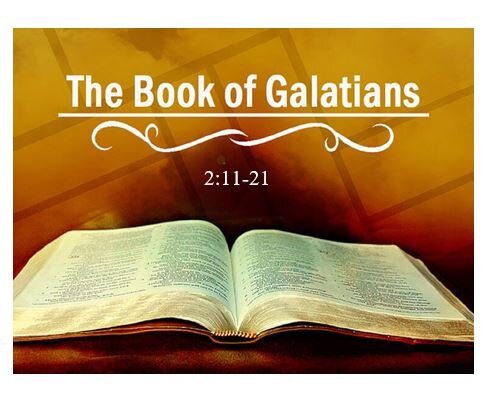BIG IDEA:
PAUL’S AUTHORITY DEMONSTRATED IN REBUKING PETER’S ERROR —
JUSTIFICATION BY FAITH LEAVES NO ROOM FOR HYPOCRISY OR LEGALISM
I. (:11-13) PETER’S HYPOCRISY DESERVED PAUL’S STRONG OPPOSITION
A. (:11a) Paul Did Not Shrink Back From His Responsibility of Confrontation
“But when Cephas came to Antioch, I opposed him to his face”
B. (:11b-13) Peter’s Hypocrisy Was Causing Serious Problems — for Himself and Others
1. (:11b) His own actions condemned him
“because he stood condemned”
2. (:12-13) His bad example was leading others astray
a. His Hypocrisy
(1) Acted first one way
“For prior to the coming of certain men from James, he used to eat with the Gentiles”
Reference is probably to the fellowship meals, the agape love- feasts of the early church.
(2) Then another way
“but when they came, he began to withdraw and hold himself aloof”
(3) Motivated by Peer Pressure
“fearing the party of the circumcision”
b. Its Negative Effect on the other Jewish Believers
“And the rest of the Jews joined him in hypocrisy”
c. Its Negative Effect on His Ministry Partner = Barnabas
“with the result that even Barnabas was carried away by their hypocrisy”
II. (:14) PETER’S HYPOCRISY COMPROMISED THE TRUTH OF THE GOSPEL
A. Any Addition of Legalism Perverts the Gospel of Grace
“But when I saw that they were not straightforward about the truth of the gospel”
B. Public Error Demands Public Censure
“I said to Cephas in the presence of all”
C. Inconsistency is the Essence of Hypocrisy
“If you, being a Jew, live like the Gentiles and not like the Jews,
how is it that you compel the Gentiles to live like Jews?”
III. (:15-21) JUSTIFICATION BY FAITH UNITES US ALL (JEW AND GENTILE) TO CHRIST SO THAT WE CAN WALK BY FAITH
A. (:15-16) Even Jews (just like Gentiles) Can Only Be Justified by Faith Alone
1. Different Spiritual Pedigree
a. Jews
“We are Jews by nature”
b. Not Gentiles
“and not sinners from among the Gentiles”
2. Same Gospel of Justification by Faith in Christ Alone (Apart from the Works of the Law)
“nevertheless knowing that a man is not justified by the works of the Law but through faith in Christ Jesus, even we have believed in Christ Jesus, that we may be justified by faith in Christ, and not by the works of the Law; since by the works of the Law shall no flesh be justified.”
Same principle stated 3 times for emphasis
B. (:17) Our Inconsistent Practice of Sin Can Never be Attributed to Our Perfect Savior
“But if, while seeking to be justified in Christ, we ourselves have also been found sinners, is Christ then a minister of sin? May it never be!”
C. (:18-21) The Key to Righteousness is Living by Grace Through Faith
1. (:18) The Old Principle of living in obedience to the ceremonial law of Judaism is inconsistent with Justification by Faith
“For if I rebuild what I have once destroyed, I prove myself to be a transgressor.”
Hogg: Re “those things which I destroyed” — “kataluo, = to loosen down, used of the demolition of a building, Matt. 24. 2, of the death of the body, 2 Cor. 5. 1, of the failure of purposes, Acts 5. 38, 39, and of the marring of a person’s spiritual well-being, Rom. 14. 20. The Lord Jesus declared that He came ‘not to destroy [kataluo] the law’, Matt. 5. 17, that is to say, not to lower the standard of Divine righteousness, not to abrogate the least of God’s requirements, but, on the contrary, in His own life to ‘magnify thelaw and make it honourable’, Isa. 42. 21.”
2. (:19) The New Principle of living by faith in Christ involves living to God
“For through the Law I died to the Law, that I might live to God.”
3. (:20) Our Union with Christ in His Death and Resurrection makes this new life of faith possible
“I have been crucified with Christ; and it is no longer I who live, but Christ lives in me; and the life which I now live in the flesh I live by faith in the Son of God, who loved me, and delivered Himself up for me.”
Hogg: “Faith is the characteristic function of the new life.”
4. (:21) Any Continued Dependence on the Law:
a. Compromises the Grace of God
“I do not nullify the grace of God”
b. Minimizes the Atonement of Christ
“for if righteousness comes through the Law, then Christ died needlessly”

